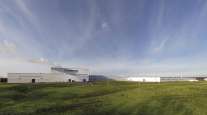June Class 8 Truck Orders Top 20,000 for Eighth Straight Month
This story appears in the July 11 print edition of Transport Topics.
Truck manufacturers received more than 20,000 orders for new Class 8 vehicles in June in North America, the eighth consecutive month above that level and 33% higher than June 2010, two market research firms reported.
ACT Research Co. said July 6 that 21,200 new orders were placed last month, up 33% from 15,999 orders in the month last year; FTR Associates reported that 20,944 orders were placed in June.
ACT, based in Columbus, Ind., said the cumulative orders in 2011 now totaled 163,143, up 143% over the 69,699 ordered in the first six months of 2010. FTR had similar cumulative data.
“What was nice to see that, despite the tenuous economic reports over the past six to eight weeks, we’ve had another month in excess of 20,000 truck orders,” Kenny Vieth, ACT’s president and senior analyst, told Transport Topics. “That’s a clear sign that the Class 8 market remained healthy.”
“The reason for that market is that truckers really need to replace their old equipment, and that has been the story of this recovery since the uptick in Class 8 demand starting in the fourth quarter of 2010,” Vieth said.
Kyle Treadway, chairman of American Truck Dealers association, agreed.
“We are seeing increases in order activity, and it seems to be across the board, regardless of the size of the customer and the industry that they’re in,” Treadway told TT.
Treadway is president of Kenworth Sales Co., West Valley City, Utah, which operates 18 locations in Mountain and Western states.
“Our experience is that all of the ordering is for replacement,” Treadway added. “Fleets really delayed their replacement cycles, and it’s going to take them a long time to get back to where they used to be” before the recession.
He said that there were “still some pockets of weakness in the country, primarily in the West, but they are also improving now.”
Jack McDevitt Jr., chief executive officer of McDevitt Truck Sales, Manchester, N.H., also agreed.
“Here in New England, we primarily sell vocational trucks, which are still weak, but about 40% of sales are for nonvocational, and we have seen some increases in orders and therefore in purchase activity, recently,” McDevitt, Mack’s ATD board member, told TT.
“Fleets working in petroleum, food delivery and retail products for dry-van delivery have all been ordering, to such a degree that we believe sales for 2011 will be 20% above what we planned for, which is great,” McDevitt said.
McDevitt’s three locations sell new Mack, Volvo, Peterbilt and Western Star trucks. He said he recently purchased two more locations in New England and will be offering Freightliner trucks as well.
Freightliner and Western Star are both divisions of Daimler Trucks North America.
Peterbilt and Kenworth are Paccar Inc. companies; Mack and Volvo belong to Volvo AB, based in Sweden.
“If the construction business comes back as well this year, well, we don’t know how high it will go,” McDevitt added.
He also said truckers were buying only for replacement.
“Fleets are running trucks that should have been replaced three or four years ago, and now they have no choice but to get new ones, because their equipment is worn out,” McDevitt said.
As many dealers have commented, other parts of McDevitt’s businesses flourished even during the recession.
“While we haven’t been making many new truck sales in the past three to four years, our parts and service departments have been doing excellent business keeping those old trucks on the road,” McDevitt added.
Daimler Trucks said the 20,000-order level represented a return to normal.
“Preliminary net orders dropped in June,” compared with May, David Hames, DTNA’s general manager for marketing and strategy, told TT. “We believe this was driven in part by longer production lead times and the usual summer slowdown. We see June order levels as closer to what we expect industrywide for the balance of 2011.”
Jonathan Starks, director of transportation analysis at FTR Associates, Nashville, Ind., also said the 20,000-order level represented expected levels for the rest of the year.
Both ACT and FTR reported that June orders were down from May, which FTR put at 24,063.
“The fact that orders came in at just over 20,000, we see that as a pretty reasonable number, although it’s down from May and the spike in April of almost 38,000 orders,” Starks told TT.




